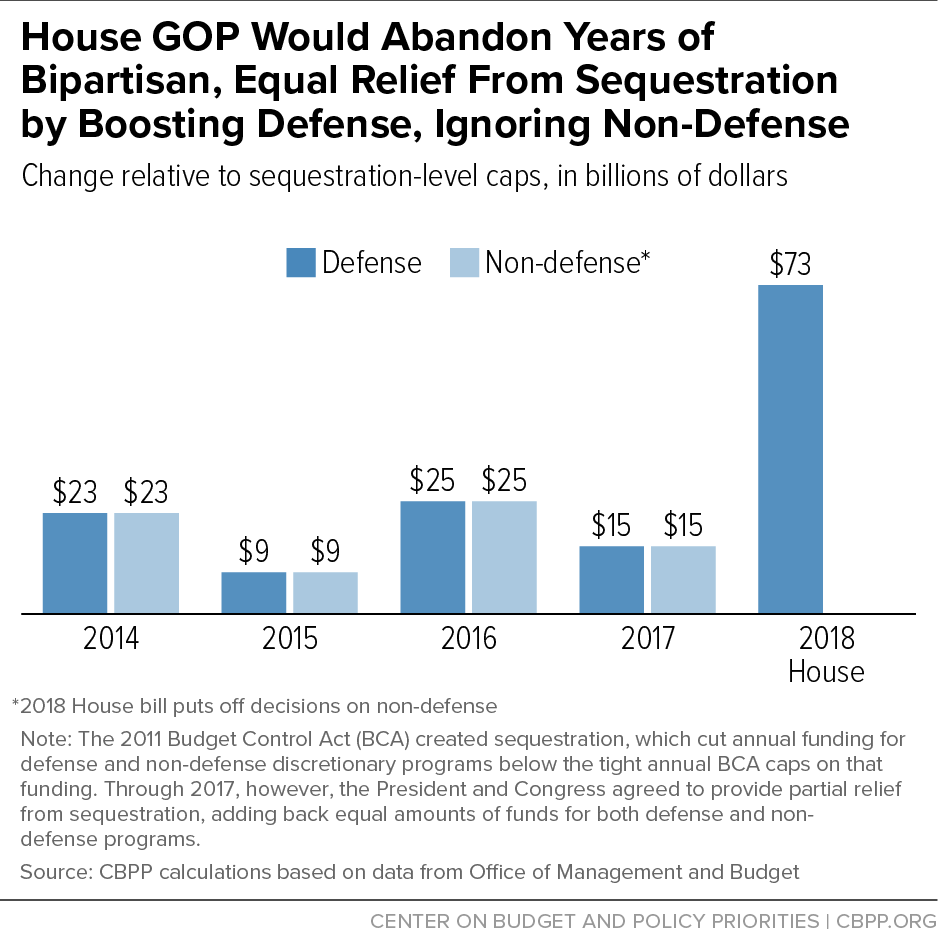BEYOND THE NUMBERS
As the congressional session draws to a close this week, policymakers face the important tasks of enacting appropriations bills for fiscal year 2018 that began on October 1, extending the Children’s Health Insurance Program (CHIP) and other expired health programs, and providing vital disaster relief for communities hard hit by hurricanes and wildfires. But House Republican leaders are advancing a bill that solves none of these problems. Instead, their legislation reiterates their desire to increase defense spending substantially while leaving non-defense priorities underfunded, offsets the cost of extending CHIP and other health programs with provisions that would leave more people without health coverage, and ignores disaster relief entirely.
To reach agreement on 2018 funding, policymakers must first address the 2011 Budget Control Act’s (BCA) legally binding caps on overall defense and non-defense funding and the further “sequestration” cuts to those caps under the BCA. Recognizing after the BCA’s enactment that the post-sequestration caps were too low to meet either defense or non-defense funding needs, the President and Congress enacted a series of sequester relief measures that raised the caps one or two years at a time, always providing equal relief to defense and non-defense categories.
The last such measure expired in September, and House and Senate leaders from both parties are discussing raising the caps for 2018 and 2019. While they haven’t reached an agreement, the discussions reportedly center on providing significant relief from defense and non-defense sequestration cuts. Now, however, House Republicans are advancing a plan that addresses underfunding only in defense. It doesn’t raise the defense cap but, instead, effectively eliminates it for 2018 (by suspending its enforcement, which normally comes through automatic reductions if defense funding exceeds the cap level). This leaves only the non-defense funding cap, which receives no relief from the full sequestration cuts.
While eliminating the defense cap, the House bill also would enact a 2018 appropriations bill for the Defense Department (DOD) while leaving the rest of government operating under a continuing resolution. Apart from additional funding for “Overseas Contingency Operations” (OCO) and “emergencies,” the DOD bill is virtually identical to what the House has passed twice this year. When combined with defense funding in other House-passed bills, regular (i.e., non-OCO and non-emergency) defense funding for 2018 would be about $622 billion — roughly $73 billion above the existing cap (see chart) and $71 billion above the 2017 level. It’s even $19 billion above President Trump’s proposal for 2018.
Meanwhile, the bill defers decisions about overall non-defense funding and the 11 other annual funding bills. Defense needs are important, but so are many non-defense needs, such as disease control and public health, scientific and medical research, medical care and other services for veterans, services and benefits for low-income people, law enforcement and homeland security, and environmental protection. (We’ve written about unmet needs in appropriated programs here and here.)
The House Republican plan to address defense funding now — rather than as part of an overall agreement for defense- and non-defense funding — would make it far less likely that House Republicans would later provide much-needed sequestration relief for non-defense funding. Fortunately, this approach has virtually no chance of gaining the 60 votes needed to pass the Senate. Senate Democrats have said they will not support legislation that addresses defense funding but ignores or shortchanges non-defense needs (and some Senate Republicans may share that view).
Indeed, addressing underfunding in both defense and non-defense areas is the basis of the agreement that House and Senate Republican and Democratic leaders are negotiating. The House Republican effort to solely address defense will take time that lawmakers could better use to reach agreement on both defense and non-defense funding, enabling the long overdue appropriations process to proceed.

